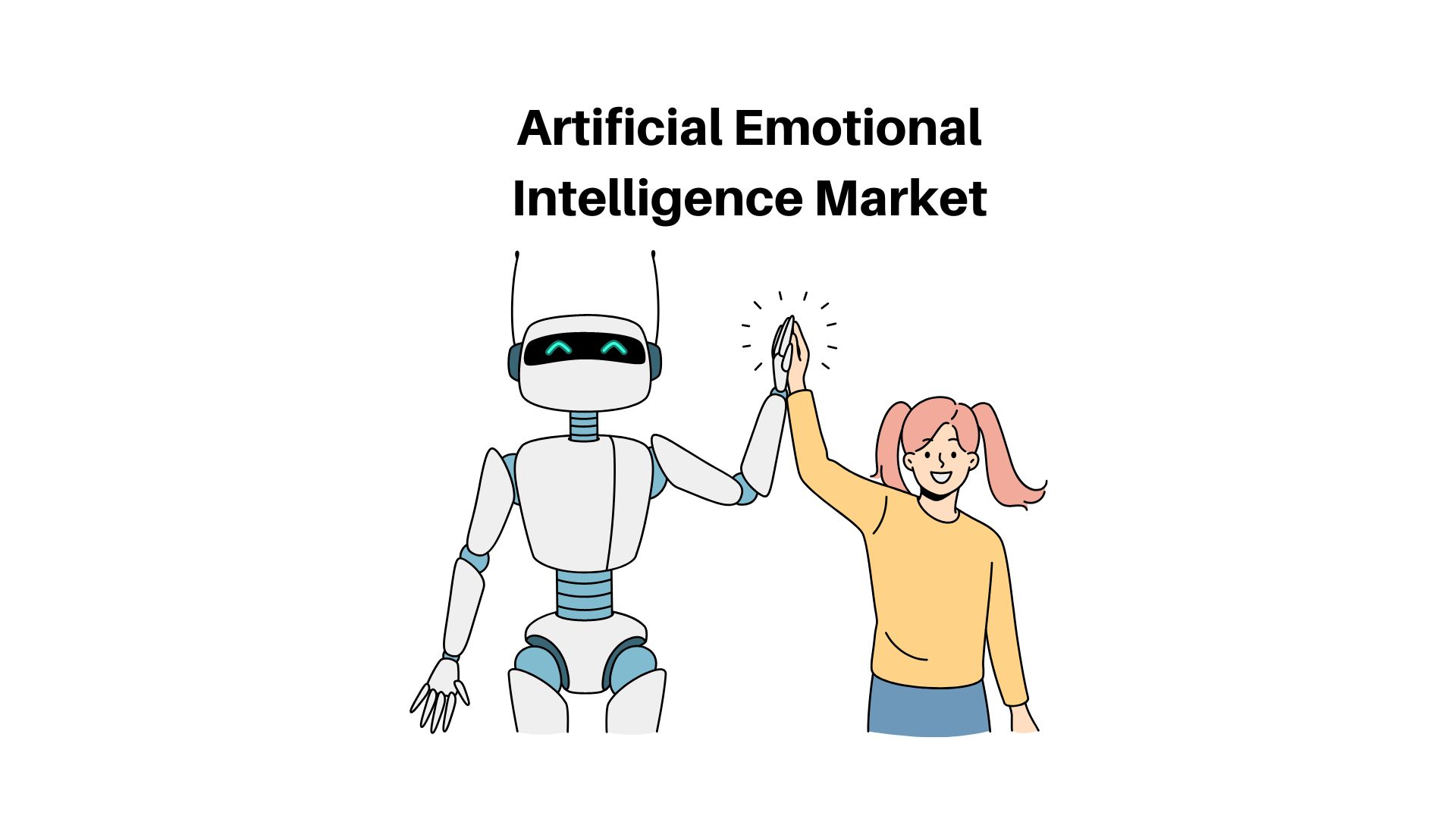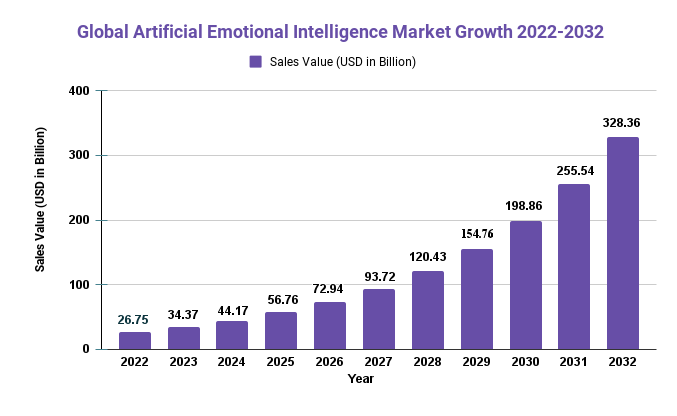Artificial Emotional Intelligence Market to Cross USD 328.36 Bn in 2032 | 28.5% CAGR

Page Contents
Published Via 11Press: Artificial Emotional Intelligence (AEI) is a branch of AI that strives to develop algorithms and machines that can recognize, understand, and respond to human emotions. Over the last few years, this market has seen remarkable expansion as technology continues to progress and become more accessible. It's expected to keep growing at this rate going forward.
Market research reports estimate the global artificial emotional intelligence market to be worth USD 26.75 Billion in 2022 and projected to expand at a CAGR of 28.5% by 2032. One major factor driving growth within this AEI market is its increasing adoption across different industries such as healthcare, retail and automotive.

Some of the key applications of AEI include:
- Healthcare: Artificial Intelligence (AEI) is being employed to improve patient outcomes by analyzing emotions to detect and address mental health issues.
- Retail: AEI is being utilized to improve customer experience by tailoring recommendations based on emotional signals and providing more efficient customer service.
- Automotive: Artificial intelligence (AEI) is being utilized to enhance driver safety by analyzing emotions to detect fatigue or distraction.
- Education: AEI is being employed to improve learning outcomes by analyzing emotions to personalize instruction and offer real-time feedback.
Request For Sample Report Before Purchasing: https://market.us/purchase-report/?report_id=60262
Key Takeaways
- The Artificial Emotions (AEI) market is a rapidly developing field of AI that strives to develop machines and algorithms capable of recognizing, understanding, and responding to human emotions.
- In 2022, the global AEI market was valued at approximately USD 26.75 billion; projected to reach USD 328.36 billion by 2026 at a compound annual growth rate (CAGR) of 28.5% between 2022 and 2032.
- The primary factors driving growth in the AEI market include the increasing adoption of AI across various industries such as healthcare, retail, and automotive, along with advances in AI technology.
- The primary applications of AEI span healthcare, retail, automotive, and education. AEI is being utilized to enhance patient outcomes, enhance customer experience, enhance driver safety, and enhance learning outcomes.
- The major players in the Artificial Intelligence market include Affectiva, Beyond Verbal, IBM, Microsoft, Apple, Google, Amazon, Intel, Qualcomm, and Softbank Robotics. These firms are investing heavily in research and development to enhance AEI capabilities while bringing new applications to market.
- Machines' ability to comprehend and respond to human emotions holds the potential to revolutionize how we engage with technology, improving many aspects of our lives in the process.
Regional Snapshot
- North America: North America is one of the leading regions in the artificial intelligence (AI) market, due to the presence of major players and the high adoption of AI technology there. The United States leads this region, followed by Canada and Mexico.
- Europe: Europe is a key region in the AEI market, with countries like Germany, France, and the United Kingdom leading the charge. The increasing adoption of AI technology across various industries and an emphasis on customer experience are driving growth within this region.
- Asia Pacific: The Asia Pacific region is expected to witness significant growth in the Artificial Intelligence market, due to the rising adoption of AI technology and emerging economies such as China, India, and Japan. There is expected to be an increased demand for AEI solutions in the healthcare, automotive, and education sectors throughout this region.
- Middle East and Africa: The Middle East and Africa region has experienced a surge in the Artificial Intelligence (AI) market, due to the increasing adoption of AI technology across industries like healthcare, retail, and education.
- Latin America: Latin America is rapidly becoming an emerging region within the Artificial Intelligence market, led by countries such as Brazil, Mexico, and Argentina. With the increasing adoption of AI technology and rising customer preference for personalized experiences, this region is set to experience explosive growth over the coming years.
Drivers
- Increasing Adoption of AI Technology: As AI adoption continues to spread throughout various industries such as healthcare, retail, automotive, and education, the demand for AEI is on the rise. Furthermore, as this sophisticated and widespread AI technology becomes more accessible, its capabilities are also growing.
- Rising Demand for Personalized Customer Experience: The growing desire for a tailored customer experience is propelling growth in the AEI market in industries such as retail and hospitality. AEI technology can be utilized to analyze customer emotions and offer tailored recommendations and services, ultimately improving their experience.
- Growing Focus on Mental Health: The increasing recognition of mental health issues has spurred the adoption of AI technology within healthcare settings. AEI can be employed to detect and address such problems through the analysis of patient emotions.
- Increasing Demand for Driver Safety: The growing concern over driver safety has driven the adoption of AEI technology in the automotive industry. AEI can be utilized to detect driver fatigue and distraction, providing warnings to enhance driver performance.
- Advancements in AI Technology: Recent advancements in AI technology, such as deep learning and natural language processing, have significantly expanded the capabilities of AEI and opened up new applications.
- Government Initiatives: Government initiatives, such as funding for AI research and development, are fueling the growth of the AEI market by encouraging the creation of new technologies and applications.
Restraints
- High Development and Deployment Costs: The development and deployment costs for AEI technology can be high, potentially hindering its adoption in some industries and regions. To meet specialized hardware and software requirements as well as data acquisition/processing fees, all add to the overall expense.
- Data Privacy and Security Concerns: AEI technology raises privacy and security issues, particularly when personal information is involved. This could potentially limit its adoption in certain industries such as healthcare where patient data is highly sensitive.
- Limited Access to Training Data: AEI models require large amounts of labeled data for training purposes, but such resources may not be readily available in certain domains. This could put a hindrance to the creation and deployment of AEI models.
- Ethical Concerns: The use of AI technology raises ethical concerns, especially when it is employed for decision-making that may directly affect human lives. For instance, using AEI in hiring or financial decisions could result in biases and discrimination.
- Lack of Understanding and Trust: Lack of understanding and trust in AI technology, including AEI, may hinder its adoption in certain industries and regions. This may also obstruct the development of new applications and use cases.
Opportunities
- Expansion into New Industries: AEI technology can be applied in a variety of sectors beyond its current applications in retail, healthcare, automotive, and education. For instance, it could be employed in gaming industries to enhance player experiences or in financial services to provide personalized advice.
- Development of New Applications: AEI technology has the potential to create numerous new applications, providing businesses with new growth prospects. For instance, it could be employed in mental health diagnosis and treatment by analyzing patient emotions and behavior.
- Integration with Other AI Technologies: Combining AEI with other AI technologies such as computer vision and natural language processing can enhance its capabilities and offer new applications. For instance, combining AEI and computer vision could enable emotion recognition in videos and images.
- Advancements in Hardware and Software: Technological advances, such as the development of specialized chips for AEI models, have allowed these models to perform better and open up new applications.
- Focusing on employee well-being: The growing attention to employee well-being may spur the adoption of Artificial Intelligence (AEI) technology in the workplace. AEI can be employed to monitor employee emotions and boost workplace satisfaction and productivity levels.
Challenges
- Lack of Standardization: Lack of standardization in the development and deployment of AEI models can cause interoperability issues and hinder collaboration among different stakeholders.
- Limited Understanding of Emotional Intelligence: There is currently a lack of comprehension regarding emotional intelligence and how it can be accurately measured or modeled, leading to inconsistencies and errors in AEI models.
- Biases in Data: Relying on biased data to develop AEI models can lead to inaccurate outcomes and reinforce existing prejudices and attitudes.
- Limited Access to High-Quality Training Data: Unfortunately, the availability of high-quality labeled data for training AEI models is limited, which may hinder the creation of accurate and resilient models.
- Regulatory Challenges: The use of AEI technology presents ethical and regulatory difficulties, particularly when it comes to data privacy and security, bias or discrimination, accountability, and transparency.
- Technical Challenges: The development and deployment of AEI models require a specialized technical skillset, which may not be available in all regions or industries.
- Integration Challenges: Integrating AEI with existing systems and processes can present unique challenges, particularly when dealing with legacy systems or complex data architectures.
Grow your profit margin with Market.us Get this Report
Recent Developments
- Increased Adoption in Healthcare: Artificial intelligence (AEI) technology is finding increasing application in the healthcare industry for mental health diagnosis and treatment, patient monitoring, and personalized care.
- Integration with Virtual Assistants: AEI is being integrated with virtual assistants such as Siri, Alexa and Google Assistant to promote more natural and empathetic interactions with users.
- Advances in Emotion Recognition: Recent improvements to emotion recognition technology, such as facial expression analysis and voice recognition, are improving the accuracy and dependability of AEI models.
- Growing Application in Marketing and Advertising: AEI is being utilized by marketers and advertisers to personalize content, target specific emotions and behaviors of customers, and measure customer loyalty.
- Integration with Robotics: AEI is collaborating with robotics to enable more natural and intuitive interactions between humans and robots, especially in customer service and education settings.
- Development of New Tools and Platforms: To make it simpler for businesses to develop and deploy AEI models, new tools and platforms are being created that make it simpler for them to adopt and utilize AEI technology.
- Focus on Data Privacy and Security: There is increasing attention paid to data privacy and security in the development and deployment of AEI models, with new regulations and standards being created to guarantee the ethical and responsible use of AEI technology.
Key Market Segments
Type
- Touch-Based
- Touchless
Application
- Market Research
- Healthcare
- Media & Advertisement
- Automotives
Key Market Players
- IBM
- Microsoft
- Eyesight Technologies
- Affectiva
- NuraLogix
- gestigon GmbH
- Crowd Emotion
- Beyond Verbal
- nViso
- Cogito Corporation
- Kairos
Nature Insights
- Multidisciplinary Field: The AEI market is a truly multidisciplinary endeavor, requiring expertise in fields such as psychology, neuroscience, computer science, and data science.
- Diverse Applications: AEI technology has numerous applications in various industries such as healthcare, education, automotive, gaming, retail, and finance.
- Data Quality Matters: AEI models require large amounts of high-quality data for training and validation, which may present a challenge in certain industries.
- Potential Impact on Human-Robot Interaction: AEI technology holds the potential to revolutionize human-robot interaction by enabling more natural, empathic interactions between humans and robots.
- Ethical and Regulatory Challenges: AEI technology presents ethical and regulatory difficulties, such as data privacy and security, bias or discrimination, accountability, and transparency.
- Rising demand for personalized experiences: The growing desire to offer tailored experiences is propelling the adoption of artificial intelligence (AEI) technology in industries such as retail, healthcare, and automotive.
- Collaboration and Standardization Are Necessary: To develop and deploy AEI models, there must be collaboration among various stakeholders such as researchers, developers, and policymakers. Standardizing the AEI models and their evaluation criteria is also essential for interoperability and benchmarking purposes.
Report Scope
| Report Attribute | Details |
| The market size value in 2022 | USD 26.75 Bn |
| Revenue forecast by 2032 | USD 328.36 Bn |
| Growth Rate | CAGR Of 28.5% |
| Regions Covered | North America, Europe, Asia Pacific, Latin America, and Middle East & Africa, and Rest of the World |
| Historical Years | 2017-2022 |
| Base Year | 2022 |
| Estimated Year | 2023 |
| Short-Term Projection Year | 2028 |
| Long-Term Projected Year | 2032 |
Contact us
Contact Person: Mr. Lawrence John
Market.us (Powered By Prudour Pvt. Ltd.)
Tel: +1 718 618 4351
Send Email: [email protected]
FAQ.
Artificial Emotional Intelligence (AEI) is a subfield of Artificial Intelligence (AI), which seeks to create machines that can comprehend, recognize and act upon human emotions.
AEI technology has numerous uses across industries such as healthcare, education, automotive, gaming, retail, and finance. Examples include mental health diagnosis and treatment, personalized marketing/advertising, and human-robot interaction enhancement.
The AEI market faces several difficulties, such as lack of standardization, limited understanding of emotional intelligence, bias in data collection, shortage of high-quality training data sets, regulatory obstacles, technical obstacles, and integration difficulties.
AEI technology is being integrated with virtual assistants like Siri, Alexa, and Google Assistant in order to facilitate more natural and empathic interactions with users. In robotics too, AEI is being utilized for more intuitive interactions between humans and robots - especially during customer service or education activities.
Recent advancements include increased adoption in healthcare, integration with virtual assistants, advances in emotion recognition, growing use in marketing and advertising, integration with robotics, development of new tools and platforms, as well as increased focus on data privacy and security.
The use of AEI technology brings with it ethical and regulatory concerns, such as data privacy and security, bias or discrimination, accountability and transparency. There is an increasing focus on developing regulations and standards to guarantee an ethical and responsible use of AEI technology.
The team behind market.us, marketresearch.biz, market.biz and more. Our purpose is to keep our customers ahead of the game with regard to the markets. They may fluctuate up or down, but we will help you to stay ahead of the curve in these market fluctuations. Our consistent growth and ability to deliver in-depth analyses and market insight has engaged genuine market players. They have faith in us to offer the data and information they require to make balanced and decisive marketing decisions.



